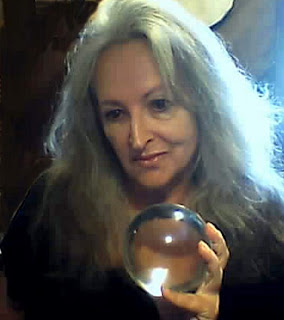 Whether it was something in the stars, coincidence, or serendipity, last week was a week for thoughts about love, relationships, and death especially for anyone interested in character studies. It was also a week for shocks. Mark Sanford, who supposedly had a perfect marriage, shocked at least the right wing of his party with his revelation of an affair of the heart and body. Farrah Fawcett's death from a hard fought battle against cancer was not a shock, but Michael Jackson's cardiac arrest (which I wrote about last week) was.
Whether it was something in the stars, coincidence, or serendipity, last week was a week for thoughts about love, relationships, and death especially for anyone interested in character studies. It was also a week for shocks. Mark Sanford, who supposedly had a perfect marriage, shocked at least the right wing of his party with his revelation of an affair of the heart and body. Farrah Fawcett's death from a hard fought battle against cancer was not a shock, but Michael Jackson's cardiac arrest (which I wrote about last week) was.It was a week for opinions and analysis on all the events-- sometimes ad nauseum. Some readers/viewers were led to look into their personal beliefs and lives. If human interactions are of interest to you, it was a moment to stop and think-- most especially of religion which can determine every other thing we do sometimes in ways we don't recognize.
If someone was a person of fundamentalist Christian faith, the answer for what Governor Mark Sanford should do about his love for another woman was clear-- ['Cubby' Culbertson, Sanford's spiritual advisor, says Darkness Gripped Sanford]. (Do you think an exorcism is on the schedule?)
From the political side, Senator Lindsay Graham, godfather to Sanford's youngest son, agrees with Culbertson at least on the what he should do part. He said if Sanford can heal his marriage, he deserves the voters to forgive him... Say what!
Okay, I understand Culbertson's viewpoint. He runs a spiritual boot camp. He's gaining new attendees for even being brought into this. Counseling a politician is good for business in that world unless, of course, the counselor ends up falling into the same trap. Would believers come to Culbertson for help if he said to Sanford, hey, your marriage is dead anyway. Go for it man! Not on a bet. He has to claim that, even if Sanford suffers the rest of his life, he's fulfilling his duty.
Lindsay Graham was taking it from a political perspective. Do you suppose he suggested the same thing to Newt Gingrich? Newt was smart to not ask for voter forgiveness until he had left his old wife, married the latest more exciting one (to him), and then could get back to being forgiven-- assuming he doesn't find another even more exciting one.
Do Republican politicians stop to think before they open their mouths? What does Sanford's marriage have to do with his job as governor? If he has a good marriage, he will be a good governor? One might say his affair led him to take off without letting anyone know where he would be. Isn't that called dereliction of duty? For a man obviously not dealing well with personal issues, his choices were slim. His wife had said-- wherever you go, don't go to Argentina. Does that sound like a possible song title?
Kathleen Parker wrote a column about the issue of Sanford and forbidden love. She wrote it from the perspective of assuming Sanford hadn't done this before and this was true love (two things that have not yet been determined to be true). Parker however was caught up in the romance as she expressed a hope for what Sanford should do next. (tip: her idea didn't jibe with Culbertson's or Graham's)-- [The Passion of Mark Sanford]. Sanford has four sons, one only 10; so his problem is not a simple one.
There was another soul mate story in the news last week as well as the death of an icon when Farrah Fawcett finally lost her battle against cancer. Whatever else you might say about Fawcett, she showed courage and grace as she did whatever she could to survive. It was not enough.
Her lover of many years (give or take a few breaks) Ryan O'Neal was with her at the end and said he had asked her to marry him. They appear to have been soul mates who ended other relationships to be together but couldn't somehow happily live together. I have said it before that soul mates don't automatically translate into happy relationships.
If Sanford takes the advice of Parker, he'll follow the lead of other great lovers (pretend you don't remember 'Casablanca') and leave his marriage to be with his lover. If he takes the advice of his friends, he'll tough it out and rebuild his damaged career-- a stronger, better man, more capable of fighting sinful temptations. Which would be likely to make him happiest? His happiness wasn't a consideration for either of the two men.
Last week, coincidentally, I had been reading Barbara Walters memoir, Audition. Although I had seen almost none of Walters' interviews, being interested in politics and human nature, I found the book to be an interesting read. She tells a lot about her experiences, but there was this one tidbit that seems to fit with my thoughts on all of this-- especially Sanford's problem-- assuming he hasn't already resolved it.
Her father was going to leave her mother when Barbara was a child. He had left the home when her mother begged Barbara to go to him asking him to return. Barbara describes doing that. What child would not?
Her father returned. Was it a huge sacrifice or was he relieved to come back? Did he shrivel up inside because he stuck with duty to fulfill his responsibilities? His latter life didn't sound happy, to say the least, but was that due to his marriage? Had he left, what would his life have been like? No clue, as he followed duty and kept the family intact.
Barbara herself has had three marriages...
(Because I like to use pictures to illustrate these blogs and I had nothing on hand for this one, I decided to take a webcam photo with my crystal ball. It's an appropriate symbol for pondering-- even if mine has yet to lead me to any visions.)




































.JPG)




















